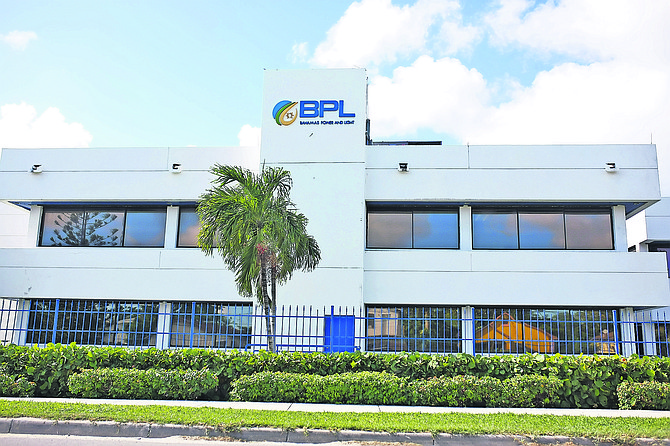By NEIL HARTNELL
Tribune Business Editor
nhartnell@tribunemedia.net
Bahamas Power & Light’s (BPL) chairman last night said it has taken “the first step” to providing long-suffering consumers with “price stability and certainty” after the Government approved its fuel hedging strategy.
Dr Donovan Moxey told Tribune Business that the state-owned energy monopoly will seek to “lock in” July’s 10-cent per kilowatt hour (KWh) fuel adjustment charge for 12-24 months to provide both business and residential consumers with complete rate certainty in their monthly billings.
He explained that this would eliminate the constant volatility caused by changes in global oil prices, which have been responsible for the sudden and steep hikes in electricity bills that many Bahamians have endured on a month-to-month basis.
With certainty in both the base rate and fuel adjustment charge, Dr Moxey said Bahamians will be better able to manage their energy costs as these will now be determined by how much electricity they will consume. He added that the long-promised hedging strategy, which Grand Bahama Power Company has employed for many years, will enable Bahamian companies to better plan for “the long haul”.
“From our perspective, this brings cost certainty in the bill for both businesses and residential consumers,” the BPL chairman told this newspaper. “What we’ve been talking about as part of the strategic plan at BPL is to reduce the cost of electricity to consumers, improve the quality of service and, over the long-term, provide price certainty.”
The 10 cents per KWh fuel adjustment charge rate that BPL is aiming to lock-in from July 2020 onwards is lower than the 11.2865 cents per KWh listed on June’s billings, and the 16.02 cents per KWh that was charged in November 2109. These cost discrepancies illustrate the financial cost to the Bahamian economy, as well as individual businesses and households, from the regular volatile swings in global oil prices.
Dr Moxey said BPL had been able to exploit historic global oil price lows as a result of the COVID-19 pandemic to build-up a sufficiently deep inventory of fuel reserves to execute its hedging strategy, which has been formally approved by the Minnis administration’s Cabinet.
The move was facilitated by the tabling of the Bahamas Electricity Corporation (BEC) Amendment Regulations 2020 in the House of Assembly yesterday by Desmond Bannister, minister of works, who has responsibility for BPL.
The changes allow for the utility’s new hedging strategy, and detail all the various charges that are wrapped up in BPL’s fuel adjustment charge, thus providing consumers with greater transparency. Besides the actual cost of BPL’s fuel itself, the charge also covers the cost of lube oil; fuel additives; “throughput fees”; foreign exchange costs and bank fees associated with buying the fuel; costs and fees linked to the fuel hedging initiative; and costs incurred from laboratory tests, inspection fees and interest.
“The fuel adjustment charge may be held constant for a period of up to 12 months in order to provide price stability to the consumer,” the regulations state. “An over or under recovery account shall be created in order to monitor the movement in this account.”
The regulations also provide for a “reconciliation adjustment” to be made to BPL’s fuel charge to deal with any alterations that may be necessary to billing and fuel costs. BPL’s fuel adjustment charge is meant to be a cost recovery or pass through levy on consumers, meaning it seeks to only recover its costs and not make a profit on this aspect of its bill.
As a result, businesses and households should be the main beneficiaries of its hedging strategy. “We have businesses that plan for the long hail, and residential customers will have certainty in their bill,” Dr Moxey added. “We’re looking to do this [hedging] for the foreseeable future, and looking at a 12 to 24-month timeline. You try to lock in the best possible price.
“We’re looking to bring a level of price stability and price certainty, and this is a first step towards doing that. This is a pretty positive development, especially if you are a business coming out of COVID that wants to monitor and manage your energy costs.
“We’ve given you the ability to have cost certainty, and you are now focused more on consumption than rate volatility. This is key for us to deliver to our customers at this time.”
BPL’s chief executive, Whitney Heastie, said in a statement that the utility has strategically built up its fuel reserves over the last months. He said: “We now have the physical inventory in place to announce that beginning July 1, 2020, BPL fuel charge for customers will be about 10 cents.
“BPL has now adopted the industry-standard practice of hedging. Hedging is a means of protection against price volatility. Through hedging, BPL can now essentially ‘lock in’ a fuel price for a set period of time, bringing unprecedented stability to electricity costs in The Bahamas. We are targeting that 10 cents range, hoping to hold the fuel cost there even when the hedged inventory enters the system in the second quarter of the fiscal year.”
Mr Heastie added that the new Wӓrtsilӓ engines at Clifton Pier power station’s Station A will also puts downward pressure on BPL’s fuel costs. And Dr Moxey said: “It’s simple: The base rates for electricity have not changed in more than ten years. The unpredictable swings in our electricity prices have been due almost exclusively to the wild swings in fuel prices on the open market.
“Once the hedged fuel costs kick-in, the major determining factor for how much you pay for your electricity will be your usage. That means that once we lock in a price, you determine – by your usage – how much you pay for electricity.”





Comments
Clamshell 5 years, 7 months ago
Price stability? How about stability in keepin’ the lights on?
DDK 5 years, 7 months ago
One thing that is cheap is talk🤣😂🤣
Sign in to comment
OpenID